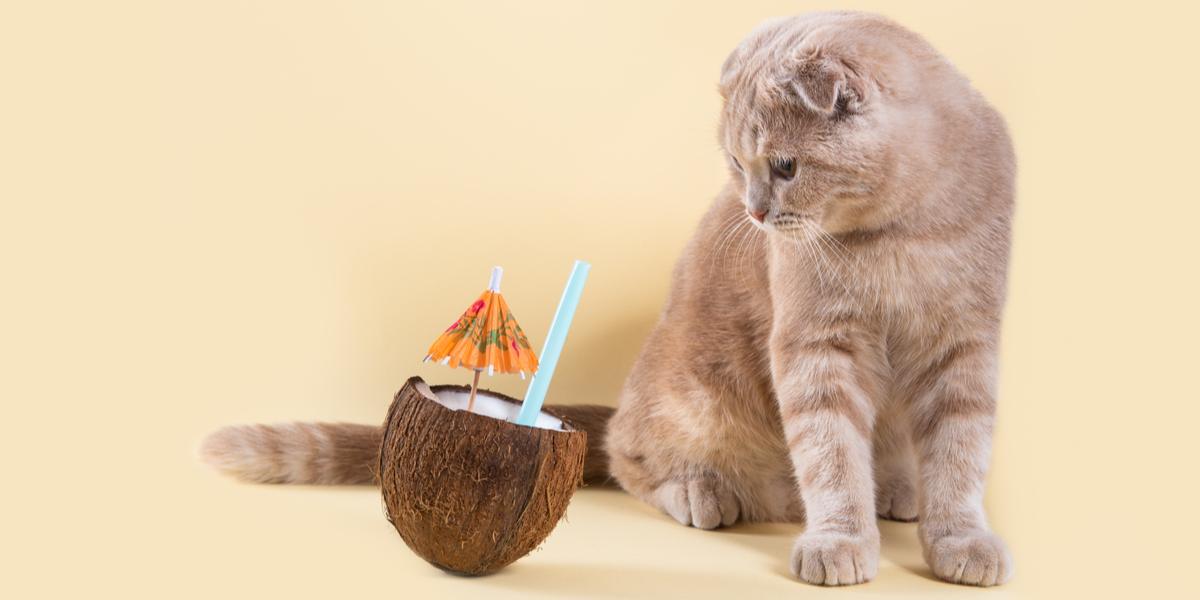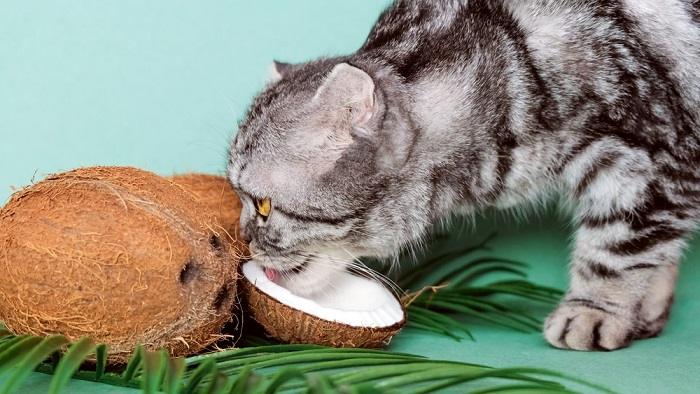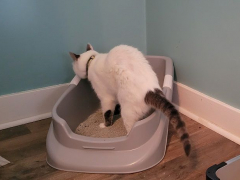
Coconut is widely considered a healthy food for humans, and coconut oil is becoming more and more popular too. People use coconut oil to keep their skin and hair nourished and use it for cooking more healthily.
So, if coconut is so good for humans, could it also be beneficial to your cat’s health? If you’re a cat owner wondering can cats eat coconut, the short answer is that, yes, cats can safely eat small amounts of coconut.
However, there are some things you should know before feeding your cat coconut meat, coconut oil, or coconut water.
Coconut is available to consume in various forms, but not all are safe for our cats. Before you feed your cat coconut, make sure you understand the risks and how you can avoid them.Quick Overview: Can Cats Eat Coconut





Summary of Content
Is Coconut Good for Cats?
Although coconut meat is high in fat, it’s mainly healthy fats that can be metabolized easily and provide a good source of energy. In humans, this type of fat, known as medium-chain triglycerides (MCTs), has been shown to reduce obesity.
Coconut meat also contains vital protein that your cat can use to grow and repair soft tissues. The iron content in coconut meat could be helpful in your cat’s red blood cell production, while selenium is a potent antioxidant.
The particularly special quality of coconut meat is that it’s high in manganese, which helps keep your cat’s bones and joints healthy while also aiding their metabolism.
Is Coconut Safe for Cats?
But before you start reaching for shredded coconut or dried coconut flakes for your cat, make sure you read about the potential risks. And don’t forget, coconut meat isn’t the only form of coconut available.
Do Cats Like the Taste of Coconut?
Cats are obligate carnivores, so they mainly enjoy eating animal protein. Most cats don’t seem particularly interested in eating coconut meat, even if it’s in the form of shredded coconut or coconut flakes. However, they may be enticed by the forbidden, creamier options like coconut yogurt or coconut milk. So, to avoid any accidents, it’s best to keep these items out of your cat’s reach.
Can Cats Have Coconut Oil or Coconut Milk?
What about coconut water, coconut oil, or coconut milk? Small amounts of coconut oil are okay, but you shouldn’t feed your cat coconut milk or coconut water. This is because coconut milk is too high in fat, and coconut water is too high in potassium.
Giving your cat coconut oil could help your cat with various ailments, from hairballs to dry skin. It’s a great moisturizer and contains good fats that could keep your kitty’s fur glossy, joints more comfortable, and skin more healthy.
Coconut oil may also have anti-inflammatory and antibacterial properties. It can be fed in small amounts or applied directly to the skin or fur. However, you should check with your veterinarian if you have concerns about your cat’s skin or coat since there could be an underlying health issue.
How Much Coconut Can a Cat Eat?

Raw coconut meat is reasonably high in fat and calories and contains protein.
Coconut meat and coconut oil are both high in fat. Therefore, you should start by offering a very small amount so as not to upset your cat’s stomach. This is especially important if they’ve never had coconut before or if they’re prone to digestive upsets or pancreatitis.
A good guideline is to start by offering a portion the size of your little fingernail. If they enjoy the coconut and don’t develop any digestive problems, you can increase the amount gradually up to a maximum of two thumbnails worth per portion.
This only applies to coconut meat and coconut oil, though, as coconut milk and coconut water could make your cat unwell and are not recommended.
Also Read: Can Cats Drink Almond Milk?
How Often Can a Cat Eat Coconut?
It’s not a good idea to feed your cat coconut too often since the high-fat levels could upset their stomach or give them pancreatitis. If you’re going to feed your cat coconut regularly, a portion once or twice a week is more than enough. If you apply coconut oil directly to your cat’s skin, you can do this more frequently. However, you need to be sure they’re not licking it off!
Is Coconut Used in Commercial Cat Food?
Coconut is sometimes used in commercial cat food but in proportions that ensure the overall balance of the cat food is appropriate. While coconut on its own would be too high in fat and calories, in combination with other ingredients, it could give your cat’s diet some vital nutrients without any risks.
Is Coconut Bad for Cats?

Coconut is sometimes used in commercial cat food but in proportions that ensure the overall balance of the cat food is appropriate.
There are plenty of risks to feeding coconut to your cat, so it’s important to take care. Firstly, if your cat has a history of pancreatitis or if they have a sensitive stomach, it’s probably not a good idea to feed them something fatty like coconut. Even cats without previous issues could develop vomiting, diarrhea, or tummy pain due to eating coconut. For this reason, it’s important to only feed small amounts, especially at first.
Coconut water is high in potassium. Potassium is needed for many functions in the body, including helping signals travel through the heart. Too much potassium, known as hyperkalemia, can slow your cat’s heart rate or even cause a heart attack.
Coconut is sometimes an ingredient in other foods, especially dairy alternatives. Avoiding giving your feline family members cow’s milk is a good idea because they are lactose intolerant. However, dairy alternatives like coconut yogurt, coconut milk, coconut ice cream, and coconut whipped cream are still high in fat. Therefore, they could still give your cat a stomach upset.
Also Read: What Is A Normal Heart Rate For A Cat?
Summary
Coconut is available to consume in various forms, but not all are safe for our cats. Before you feed your cat coconut, make sure you understand the risks and how you can avoid them.
Frequently Asked Questions
Can coconut make cats sick?
Coconut meat is high in fat, which can make cats sick. Fatty foods can upset your cat’s digestive system, causing vomiting and loose stools. They can also cause inflammation of the pancreas gland, known as pancreatitis. If you're thinking of feeding your cat coconut, feed only a small amount of coconut meat or coconut oil.
Why do cats eat coconut?
Cats might enjoy the creamy texture of coconut cream, coconut yogurt, or coconut milk. However, these dairy milk alternatives are usually high in fat and should be avoided.
Why does my cat love coconut?
Every cat is different, and some cats do love fresh coconut. If you're going to feed your cat coconut as a treat, you should only give it once or twice a week and just a tiny amount.
Is coconut good for cats’ skin?
Coconut oil may help make your cat's skin healthier, especially if it's dry. It's worth remembering, though, that there are many causes of dermatitis, and many require specific treatment. If you're concerned about your cat's skin, you should speak to your veterinarian before trying any home remedies.







